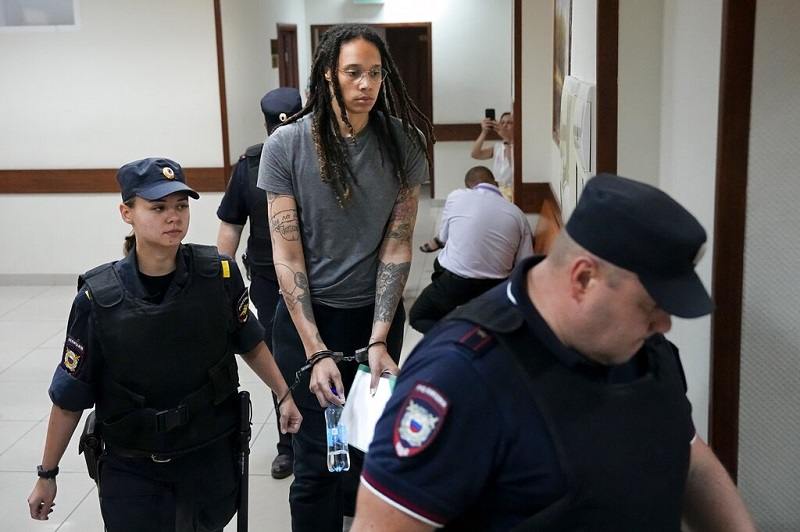
WNBA star and two-time Olympic gold medalist Brittney Griner is escorted in a court room prior to a hearing, in Khimki just outside Moscow, Russia, Thursday, Aug. 4, 2022.
13:19 JST, August 6, 2022
WNBA star Brittney Griner received a harsh 9 1/2-year prison sentence Thursday in her trial on drug charges in Moscow, close to the maximum term possible.
The basketball star’s attorneys plan to appeal, as the Biden administration urges Moscow to accept a deal to free Griner and former security consultant Paul Whelan, an American serving a 16-year sentence in Russia. Washington has declined to say whether the two could be released in exchange for imprisoned Russian arms dealer Viktor Bout.
If diplomatic efforts or the appeal fail, Griner could be sent to a penal colony, a Russian prison facility known for brutal conditions.
Here’s what to know.
Q: What is a penal colony?
A: The penal system in Russia, which has one of the highest incarceration rates in a European country, oversees nearly 520,000 inmates, the Associated Press reported last year. Most of the prison facilities in Russia are known as penal colonies because inmates are required to perform labor during their sentence.
These institutions inherit many of their practices from the gulags, a network of forced-labor camps that stretched across the Soviet Union. Soviet leaders from Joseph Stalin onward wielded the gulags as a tool of political repression and exploited prison labor to kick-start the country’s industrialization and later build major infrastructure projects. Among the best-known documentation of this period is “The Gulag Archipelago” by Nobel Prize-winning novelist and dissident Aleksandr Solzhenitsyn, who spent eight years in the camps.
Modern-day Russian penal colonies have become moneymaking enterprises, according to Olga Romanova, a Russian journalist and founder of a prisoners’ rights organization. She wrote in 2017 that every correctional facility has a production unit such as a sewing factory or a woodworking or metalworking shop, with most of the profits going to intermediary companies buying and selling on low-cost goods, or to the prison authorities “through kickbacks by companies that purchase the goods directly.”
Q: What is life in a penal colony like?
A: Among the most prominent figures in recent years to toil inside a Russian penal colony is opposition politician Alexei Navalny, who was jailed after recovering from a poisoning attack. An outspoken Kremlin critic, Navalny was sent to Penal Colony No. 2, east of Moscow, before he was reportedly transferred in June to a high-security facility, which his spokeswoman described as “a monstrous place.”
Through social media posts from his allies and family, Navalny painted a grim picture of life inside Penal Colony No. 2, calling it “our friendly concentration camp.” He accused guards of denying him proper medical care or the chance to sleep and described dehumanizing surveillance.
Media investigations have reported abuse of prisoners at such facilities. In 2017, Russian news outlet Novaya Gazeta published a video that prompted outrage, showing guards beating an inmate with truncheons. The chairman of the U.N. Committee Against Torture said in 2018 that nearly 4,000 deaths were recorded at detention centers in Russia. Last year, the independent newspaper also released clips of uniformed guards striking inmates, including a man whose family said he later died of liver damage.
Members of Russian punk rock band Pussy Riot were sentenced to two years in labor colonies in 2012 over a protest performance at a Moscow cathedral, before escaping the country more recently. One of them, Nadezhda Tolokonnikova, went on hunger strike in 2013 to protest what she described as slave-like labor – including 16 to 17 hours of work a day – and threats to her life at Penal Colony No. 14, The Washington Post reported at the time.
Q: Why was Brittney Griner in Russia?
A: A two-time Olympic gold medalist, Griner played for the UMMC Ekaterinburg team based in the Russian city of Yekaterinburg during the WNBA offseason.
During the trial, she called Yekaterinburg her “second home.”
She said she was moved by the comradeship she found with her teammates there and by the enthusiasm of her fans, especially the young girls who would wait outside the team’s change rooms to greet her. “That’s why I kept coming back,” she said.
Q: What drugs did Brittney Griner take to Russia?
A: The Phoenix Mercury player was detained in February over vape cartridges with less than a gram of cannabis oil and pleaded guilty last month to carrying the cartridges into Russia – where carrying the substance is illegal. The prosecution contended that the 0.702 grams of cannabis found in her luggage after she landed at a Moscow airport was a “significant” amount.
Ahead of the sentencing, Griner said through a court interpreter that she never intended to break Russian law. She said she had made “an honest mistake under stress” as she rushed to pack, unaware that the vape cartridges were in her baggage before flying to Moscow.
Griner testified that she uses cannabis oil in the United States for treatment of chronic pain from injuries but knew that carrying cannabis into Russia was illegal. She also said she flew to Russia despite U.S. State Department travel warnings because she did not want to let her Russian team down.
Q: What are Russia’s drug laws?
A: Griner’s sentence would be a harsh outlier in many countries, but is in line with Russia’s strict drug penalties.
Griner was convicted of violating article 229¹(2)(c) of the Russian criminal code, which prohibits smuggling narcotics in a “significant amount,” defined quite aggressively, and carries with it “a minimum sentence of five to 10 years ‘deprivation of freedom’ along with the fine,” William E. Butler, an expert on Russian law at Penn State University, wrote in an article for the Conversation, a news and analysis site. Sentences at “the upper end of the spectrum seems to be common.”
“To many in the U.S., nine years’ imprisonment may seem like a harsh penalty for cannabis possession,” Butler wrote. “But in Russia, it is par for the course for this crime.”
Critics of Russia’s drug laws have accused the country of enforcing draconian, punitive measures that violate human rights. Russia has had a serious illicit drug problem since the collapse of the Soviet Union, with far higher rates of drug addiction and drug-related mortality than its European neighbors.
Top Articles in News Services
-

Survey Shows False Election Info Perceived as True
-

Prudential Life Expected to Face Inspection over Fraud
-

Hong Kong Ex-Publisher Jimmy Lai’s Sentence Raises International Outcry as China Defends It
-

Japan’s Nikkei Stock Average Touches 58,000 as Yen, Jgbs Rally on Election Fallout (UPDATE 1)
-

Trump Names Former Federal Reserve Governor Warsh as the Next Fed Chair, Replacing Powell
JN ACCESS RANKING
-

Japan PM Takaichi’s Cabinet Resigns en Masse
-

Japan Institute to Use Domestic Commercial Optical Lattice Clock to Set Japan Standard Time
-

Israeli Ambassador to Japan Speaks about Japan’s Role in the Reconstruction of Gaza
-

Man Infected with Measles Reportedly Dined at Restaurant in Tokyo Station
-

Man Infected with Measles May Have Come in Contact with Many People in Tokyo, Went to Store, Restaurant Around When Symptoms Emerged
























